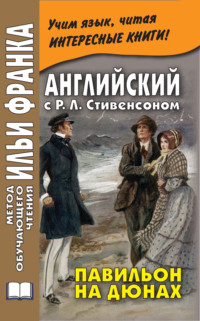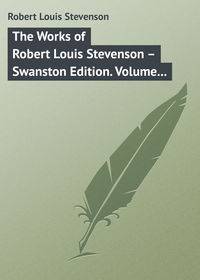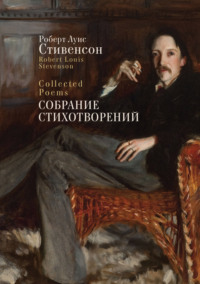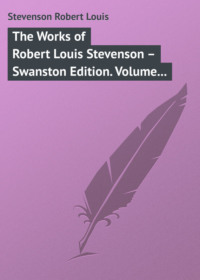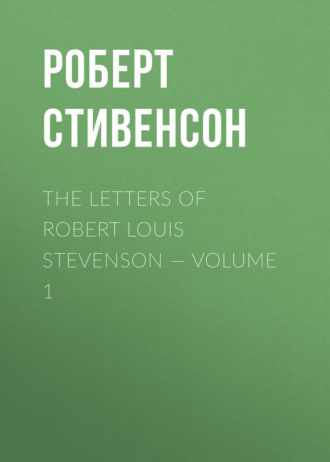 полная версия
полная версияThe Letters of Robert Louis Stevenson — Volume 1
I have just finished a paper, 'A Gossip on Romance,' in which I have tried to do, very popularly, about one-half of the matter you wanted me to try. In a way, I have found an answer to the question. But the subject was hardly fit for so chatty a paper, and it is all loose ends. If ever I do my book on the Art of Literature, I shall gather them together and be clear.
To-morrow, having once finished off the touches still due on this, I shall tackle SAN FRANCISCO for you. Then the tide of work will fairly bury me, lost to view and hope. You have no idea what it costs me to wring out my work now. I have certainly been a fortnight over this Romance, sometimes five hours a day; and yet it is about my usual length — eight pages or so, and would be a d-d sight the better for another curry. But I do not think I can honestly re-write it all; so I call it done, and shall only straighten words in a revision currently.
I had meant to go on for a great while, and say all manner of entertaining things. But all's gone. I am now an idiot. — Yours ever,
R. L. S.Letter: TO W. E. HENLEY
[CHALET AM STEIN, DAVOS, MARCH 1882.]MY DEAR HENLEY, — .. Last night we had a dinner-party, consisting of the John Addington, curry, onions (lovely onions), and beefsteak. So unusual is any excitement, that F. and I feel this morning as if we had been to a coronation. However I must, I suppose, write.
I was sorry about your female contributor squabble. 'Tis very comic, but really unpleasant. But what care I? Now that I illustrate my own books, I can always offer you a situation in our house — S. L. Osbourne and Co. As an author gets a halfpenny a copy of verses, and an artist a penny a cut, perhaps a proof-reader might get several pounds a year.
O that Coronation! What a shouting crowd there was! I obviously got a firework in each eye. The king looked very magnificent, to be sure; and that great hall where we feasted on seven hundred delicate foods, and drank fifty royal wines — QUEL COUP D'OEIL! but was it not over-done, even for a coronation — almost a vulgar luxury? And eleven is certainly too late to begin dinner. (It was really 6.30 instead of 5.30.)
Your list of books that Cassells have refused in these weeks is not quite complete; they also refused: -
1. Six undiscovered Tragedies, one romantic Comedy, a fragment of Journal extending over six years, and an unfinished Autobiography reaching up to the first performance of King John. By William Shakespeare.
2. The journals and Private Correspondence of David, King of Israel.
3. Poetical Works of Arthur, Iron Dook of Wellington, including a Monody on Napoleon.
4. Eight books of an unfinished novel, SOLOMON CRABB. By Henry Fielding.
5. Stevenson's Moral Emblems.
You also neglected to mention, as PER CONTRA, that they had during
the same time accepted and triumphantly published Brown's HANDBOOK
TO CRICKET, Jones's FIRST FRENCH READER, and Robinson's PICTURESQUE
CHESHIRE, uniform with the same author's STATELY HOMES OF SALOP.
O if that list could come true! How we would tear at Solomon Crabb! O what a bully, bully, bully business. Which would you read first — Shakespeare's autobiography, or his journals? What sport the monody on Napoleon would be — what wooden verse, what stucco ornament! I should read both the autobiography and the journals before I looked at one of the plays, beyond the names of them, which shows that Saintsbury was right, and I do care more for life than for poetry. No — I take it back. Do you know one of the tragedies — a Bible tragedy too — DAVID — was written in his third period — much about the same time as Lear? The comedy, APRIL RAIN, is also a late work. BECKETT is a fine ranting piece, like RICHARD II., but very fine for the stage. Irving is to play it this autumn when I'm in town; the part rather suits him — but who is to play Henry — a tremendous creation, sir. Betterton in his private journal seems to have seen this piece; and he says distinctly that Henry is the best part in any play. 'Though,' he adds, 'how it be with the ancient plays I know not. But in this I have ever feared to do ill, and indeed will not be persuaded to that undertaking.' So says Betterton. RUFUS is not so good; I am not pleased with RUFUS; plainly a RIFACCIMENTO of some inferior work; but there are some damned fine lines. As for the purely satiric ill-minded ABELARD AND HELOISE, another TROILUS, QUOI! it is not pleasant, truly, but what strength, what verve, what knowledge of life, and the Canon! What a finished, humorous, rich picture is the Canon! Ah, there was nobody like Shakespeare. But what I like is the David and Absalom business. Absalom is so well felt — you love him as David did; David's speech is one roll of royal music from the first act to the fifth.
I am enjoying SOLOMON CRABB extremely; Solomon's capital adventure with the two highwaymen and Squire Trecothick and Parson Vance; it is as good, I think, as anything in Joseph Andrews. I have just come to the part where the highwayman with the black patch over his eye has tricked poor Solomon into his place, and the squire and the parson are hearing the evidence. Parson Vance is splendid. How good, too, is old Mrs. Crabb and the coastguardsman in the third chapter, or her delightful quarrel with the sexton of Seaham; Lord Conybeare is surely a little overdone; but I don't know either; he's such damned fine sport. Do you like Sally Barnes? I'm in love with her. Constable Muddon is as good as Dogberry and Verges put together; when he takes Solomon to the cage, and the highwayman gives him Solomon's own guinea for his pains, and kisses Mrs. Muddon, and just then up drives Lord Conybeare, and instead of helping Solomon, calls him all the rascals in Christendom — O Henry Fielding, Henry Fielding! Yet perhaps the scenes at Seaham are the best. But I'm bewildered among all these excellences.
Stay, cried a voice that made the welkin crack - This here's a dream, return and study BLACK!— Ever yours,
R. L. S.Letter: TO ALEXANDER IRELAND
[CHALET AM STEIN, DAVOS, MARCH 1882.]MY DEAR SIR, — This formidable paper need not alarm you; it argues nothing beyond penury of other sorts, and is not at all likely to lead me into a long letter. If I were at all grateful it would, for yours has just passed for me a considerable part of a stormy evening. And speaking of gratitude, let me at once and with becoming eagerness accept your kind invitation to Bowdon. I shall hope, if we can agree as to dates when I am nearer hand, to come to you sometime in the month of May. I was pleased to hear you were a Scot; I feel more at home with my compatriots always; perhaps the more we are away, the stronger we feel that bond.
You ask about Davos; I have discoursed about it already, rather sillily I think, in the PALL MALL, and I mean to say no more, but the ways of the Muse are dubious and obscure, and who knows? I may be wiled again. As a place of residence, beyond a splendid climate, it has to my eyes but one advantage — the neighbourhood of J. A. Symonds — I dare say you know his work, but the man is far more interesting. It has done me, in my two winters' Alpine exile, much good; so much, that I hope to leave it now for ever, but would not be understood to boast. In my present unpardonably crazy state, any cold might send me skipping, either back to Davos, or further off. Let us hope not. It is dear; a little dreary; very far from many things that both my taste and my needs prompt me to seek; and altogether not the place that I should choose of my free will.
I am chilled by your description of the man in question, though I had almost argued so much from his cold and undigested volume. If the republication does not interfere with my publisher, it will not interfere with me; but there, of course, comes the hitch. I do not know Mr. Bentley, and I fear all publishers like the devil from legend and experience both. However, when I come to town, we shall, I hope, meet and understand each other as well as author and publisher ever do. I liked his letters; they seemed hearty, kind, and personal. Still — I am notedly suspicious of the trade — your news of this republication alarms me.
The best of the present French novelists seems to me, incomparably, Daudet. LES ROIS EN EXIL comes very near being a masterpiece. For Zola I have no toleration, though the curious, eminently bourgeois, and eminently French creature has power of a kind. But I would he were deleted. I would not give a chapter of old Dumas (meaning himself, not his collaborators) for the whole boiling of the Zolas. Romance with the smallpox — as the great one: diseased anyway and blackhearted and fundamentally at enmity with joy.
I trust that Mrs. Ireland does not object to smoking; and if you are a teetotaller, I beg you to mention it before I come — I have all the vices; some of the virtues also, let us hope — that, at least, of being a Scotchman, and yours very sincerely,
ROBERT LOUIS STEVENSON.P.S. — My father was in the old High School the last year, and walked in the procession to the new. I blush to own I am an Academy boy; it seems modern, and smacks not of the soil.
P.P.S. — I enclose a good joke — at least, I think so — my first efforts at wood engraving printed by my stepson, a boy of thirteen. I will put in also one of my later attempts. I have been nine days at the art — observe my progress.
R. L. S.Letter: TO EDMUND GOSSE.
DAVOS, MARCH 23, 1882MY DEAR WEG, — And I had just written the best note to Mrs. Gosse that was in my power. Most blameable.
I now send (for Mrs. Gosse).
BLACK CANYON.Also an advertisement of my new appearance as poet (bard, rather) and hartis on wood. The cut represents the Hero and the Eagle, and is emblematic of Cortez first viewing the Pacific Ocean, which (according to the bard Keats) it took place in Darien. The cut is much admired for the sentiment of discovery, the manly proportions of the voyager, and the fine impression of tropical scenes and the untrodden WASTE, so aptly rendered by the hartis.
I would send you the book; but I declare I'm ruined. I got a penny a cut and a halfpenny a set of verses from the flint-hearted publisher, and only one specimen copy, as I'm a sinner. — was apostolic alongside of Osbourne.
I hope you will be able to decipher this, written at steam speed with a breaking pen, the hotfast postman at my heels. No excuse, says you. None, sir, says I, and touches my 'at most civil (extraordinary evolution of pen, now quite doomed — to resume — ) I have not put pen to the Bloody Murder yet. But it is early on my list; and when once I get to it, three weeks should see the last bloodstain — maybe a fortnight. For I am beginning to combine an extraordinary laborious slowness while at work, with the most surprisingly quick results in the way of finished manuscripts. How goes Gray? Colvin is to do Keats. My wife is still not well. — Yours ever,
R. L. S.Letter: TO DR. ALEXANDER JAPP
[CHALET AM STEIN, DAVOS, MARCH 1882.]MY DEAR DR. JAPP, — You must think me a forgetful rogue, as indeed I am; for I have but now told my publisher to send you a copy of the FAMILIAR STUDIES. However, I own I have delayed this letter till I could send you the enclosed. Remembering the nights at Braemar when we visited the Picture Gallery, I hoped they might amuse you. You see, we do some publishing hereaway. I shall hope to see you in town in May. — Always yours faithfully,
ROBERT LOUIS STEVENSON.Letter: TO DR. ALEXANDER JAPP
CHALET BUOL, DAVOS, APRIL 1, 1882MY DEAR DR. JAPP, — A good day to date this letter, which is in fact a confession of incapacity. During my wife's illness I somewhat lost my head, and entirely lost a great quire of corrected proofs. This is one of the results; I hope there are none more serious. I was never so sick of any volume as I was of that; was continually receiving fresh proofs with fresh infinitesimal difficulties. I was ill — I did really fear my wife was worse than ill. Well, it's out now; and though I have observed several carelessnesses myself, and now here's another of your finding — of which, indeed, I ought to be ashamed — it will only justify the sweeping humility of the Preface.
Symonds was actually dining with us when your letter came, and I communicated your remarks... He is a far better and more interesting thing than any of his books.
The Elephant was my wife's; so she is proportionately elate you should have picked it out for praise — from a collection, let me add, so replete with the highest qualities of art.
My wicked carcase, as John Knox calls it, holds together wonderfully. In addition to many other things, and a volume of travel, I find I have written, since December, 9 °CORNHILL pages of magazine work — essays and stories: 40,000 words, and I am none the worse — I am the better. I begin to hope I may, if not outlive this wolverine upon my shoulders, at least carry him bravely like Symonds and Alexander Pope. I begin to take a pride in that hope.
I shall be much interested to see your criticisms; you might perhaps send them to me. I believe you know that is not dangerous; one folly I have not — I am not touchy under criticism.
Lloyd and my wife both beg to be remembered; and Lloyd sends as a present a work of his own. I hope you feel flattered; for this is SIMPLY THE FIRST TIME HE HAS EVER GIVEN ONE AWAY. I have to buy my own works, I can tell you. — Yours very sincerely,
ROBERT LOUIS STEVENSON.Letter: TO W. E. HENLEY
[CHALET AM STEIN, DAVOS, APRIL 1882.]MY DEAR HENLEY, — I hope and hope for a long letter — soon I hope to be superseded by long talks — and it comes not. I remember I have never formally thanked you for that hundred quid, nor in general for the introduction to Chatto and Windus, and continue to bury you in copy as if you were my private secretary. Well, I am not unconscious of it all; but I think least said is often best, generally best; gratitude is a tedious sentiment, it's not ductile, not dramatic.
If Chatto should take both, CUI DEDICARE? I am running out of dedikees; if I do, the whole fun of writing is stranded. TREASURE ISLAND, if it comes out, and I mean it shall, of course goes to
Lloyd. Lemme see, I have now dedicated to
W. E. H. [William Ernest Henley].
S. C. [Sidney Colvin].
T. S. [Thomas Stevenson].
Simp. [Sir Walter Simpson].
There remain: C. B., the Williamses — you know they were the parties who stuck up for us about our marriage, and Mrs. W. was my guardian angel, and our Best Man and Bridesmaid rolled in one, and the only third of the wedding party — my sister-in-law, who is booked for PRINCE OTTO — Jenkin I suppose sometime — George Meredith, the only man of genius of my acquaintance, and then I believe I'll have to take to the dead, the immortal memory business.
Talking of Meredith, I have just re-read for the third and fourth time THE EGOIST. When I shall have read it the sixth or seventh, I begin to see I shall know about it. You will be astonished when you come to re-read it; I had no idea of the matter — human, red matter he has contrived to plug and pack into that strange and admirable book. Willoughby is, of course, a pure discovery; a complete set of nerves, not heretofore examined, and yet running all over the human body — a suit of nerves. Clara is the best girl ever I saw anywhere. Vernon is almost as good. The manner and the faults of the book greatly justify themselves on further study. Only Dr. Middleton does not hang together; and Ladies Busshe and Culmer SONT DES MONSTRUOSITES. Vernon's conduct makes a wonderful odd contrast with Daniel Deronda's. I see more and more that Meredith is built for immortality.
Talking of which, Heywood, as a small immortal, an immortalet, claims some attention. THE WOMAN KILLED WITH KINDNESS is one of the most striking novels — not plays, though it's more of a play than anything else of his — I ever read. He had such a sweet, sound soul, the old boy. The death of the two pirates in FORTUNE BY SEA AND LAND is a document. He had obviously been present, and heard Purser and Clinton take death by the beard with similar braggadocios. Purser and Clinton, names of pirates; Scarlet and Bobbington, names of highwaymen. He had the touch of names, I think. No man I ever knew had such a sense, such a tact, for English nomenclature: Rainsforth, Lacy, Audley, Forrest, Acton, Spencer, Frankford — so his names run.
Byron not only wrote DON JUAN; he called Joan of Arc 'a fanatical strumpet.' These are his words. I think the double shame, first to a great poet, second to an English noble, passes words.
Here is a strange gossip. — I am yours loquaciously,
R. L. S.My lungs are said to be in a splendid state. A cruel examination, an exaNIMation I may call it, had this brave result. TAIAUT! Hillo! Hey! Stand by! Avast! Hurrah!
Letter: TO MRS. T. STEVENSON
[CHALET AM STEIN, DAVOS, APRIL 9, 1882.]MY DEAR MOTHER, — Herewith please find belated birthday present.
Fanny has another.
Cockshot=Jenkin. But
Jack=Bob. pray
Burly=Henley. regard
Athelred=Simpson. these
Opalstein=Symonds. as
Purcel=Gosse. secrets.
My dear mother, how can I keep up with your breathless changes? Innerleithen, Cramond, Bridge of Allan, Dunblane, Selkirk. I lean to Cramond, but I shall be pleased anywhere, any respite from Davos; never mind, it has been a good, though a dear lesson. Now, with my improved health, if I can pass the summer, I believe I shall be able no more to exceed, no more to draw on you. It is time I sufficed for myself indeed. And I believe I can.
I am still far from satisfied about Fanny; she is certainly better, but it is by fits a good deal, and the symptoms continue, which should not be. I had her persuaded to leave without me this very day (Saturday 8th), but the disclosure of my mismanagement broke up that plan; she would not leave me lest I should mismanage more. I think this an unfair revenge; but I have been so bothered that I cannot struggle. All Davos has been drinking our wine. During the month of March, three litres a day were drunk — O it is too sickening — and that is only a specimen. It is enough to make any one a misanthrope, but the right thing is to hate the donkey that was duped — which I devoutly do.
I have this winter finished TREASURE ISLAND, written the preface to the STUDIES, a small book about the INLAND VOYAGE size, THE SILVERADO SQUATTERS, and over and above that upwards of ninety (90) CORNHILL pages of magazine work. No man can say I have been idle.
— Your affectionate son,
R. L. STEVENSON.Letter: TO EDMUND GOSSE
[EDINBURGH] SUNDAY [JUNE 1882].. NOTE turned up, but no gray opuscule, which, however, will probably turn up to-morrow in time to go out with me to Stobo Manse, Peeblesshire, where, if you can make it out, you will be a good soul to pay a visit. I shall write again about the opuscule; and about Stobo, which I have not seen since I was thirteen, though my memory speaks delightfully of it.
I have been very tired and seedy, or I should have written before, INTER ALIA, to tell you that I had visited my murder place and found LIVING TRADITIONS not yet in any printed book; most startling. I also got photographs taken, but the negatives have not yet turned up. I lie on the sofa to write this, whence the pencil; having slept yesterdays — 1+4+7.5 = 12.5 hours and being (9 A.M.) very anxious to sleep again. The arms of Porpus, quoi! A poppy gules, etc.
From Stobo you can conquer Peebles and Selkirk, or to give them their old decent names, Tweeddale and Ettrick. Think of having been called Tweeddale, and being called PEEBLES! Did I ever tell you my skit on my own travel books? We understand that Mr. Stevenson has in the press another volume of unconventional travels: PERSONAL ADVENTURES IN PEEBLESSHIRE. JE LA TROUVE MECHANTE. — Yours affectionately,
R. L. S.— Did I say I had seen a verse on two of the Buccaneers? I did, and CA-Y-EST.
Letter: TO EDMUND GOSSE
STOBO MANSE, PEEBLESSHIRE [JULY 1882] I would shoot you, but I have no bow: The place is not called Stobs, but Stobo. As Gallic Kids complain of 'Bobo,' I mourn for your mistake of Stobo.First, we shall be gone in September. But if you think of coming in August, my mother will hunt for you with pleasure. We should all be overjoyed — though Stobo it could not be, as it is but a kirk and manse, but possibly somewhere within reach. Let us know.
Second, I have read your Gray with care. A more difficult subject I can scarce fancy; it is crushing; yet I think you have managed to shadow forth a man, and a good man too; and honestly, I doubt if I could have done the same. This may seem egoistic; but you are not such a fool as to think so. It is the natural expression of real praise. The book as a whole is readable; your subject peeps every here and there out of the crannies like a shy violet — he could do no more — and his aroma hangs there.
I write to catch a minion of the post. Hence brevity. Answer about the house. — Yours affectionately,
R. L S.Letter: TO W. E. HENLEY
[STOBO MANSE, JULY 1882.]DEAR HENLEY... I am not worth an old damn. I am also crushed by bad news of Symonds; his good lung going; I cannot help reading it as a personal hint; God help us all! Really I am not very fit for work; but I try, try, and nothing comes of it.
I believe we shall have to leave this place; it is low, damp, and MAUCHY; the rain it raineth every day; and the glass goes tol-de- rol-de riddle.
Yet it's a bonny bit; I wish I could live in it, but doubt. I wish I was well away somewhere else. I feel like flight some days; honour bright.
Pirbright Smith is well. Old Mr. Pegfurth Bannatyne is here staying at a country inn. His whole baggage is a pair of socks and a book in a fishing-basket; and he borrows even a rod from the landlord. He walked here over the hills from Sanquhar, 'singin', he says, 'like a mavis.' I naturally asked him about Hazlitt. 'He wouldnae take his drink,' he said, 'a queer, queer fellow.' But did not seem further communicative. He says he has become 'releegious,' but still swears like a trooper. I asked him if he had no headquarters. 'No likely,' said he. He says he is writing his memoirs, which will be interesting. He once met Borrow; they boxed; 'and Geordie,' says the old man chuckling, 'gave me the damnedest hiding.' Of Wordsworth he remarked, 'He wasnae sound in the faith, sir, and a milk-blooded, blue-spectacled bitch forbye. But his po'mes are grand — there's no denying that.' I asked him what his book was. 'I havenae mind,' said he — that was his only book! On turning it out, I found it was one of my own, and on showing it to him, he remembered it at once. 'O aye,' he said, 'I mind now. It's pretty bad; ye'll have to do better than that, chieldy,' and chuckled, chuckled. He is a strange old figure, to be sure. He cannot endure Pirbright Smith — 'a mere aesthAtic,' he said. 'Pooh!' 'Fishin' and releegion — these are my aysthatics,' he wound up.
I thought this would interest you, so scribbled it down. I still hope to get more out of him about Hazlitt, though he utterly pooh- poohed the idea of writing H.'s life. 'Ma life now,' he said, 'there's been queer things in IT.' He is seventy-nine! but may well last to a hundred! — Yours ever,
R. L S.CHAPTER VI — MARSEILLES AND HYERES, OCTOBER 1882-AUGUST 1884
Letter: TO THE EDITOR OF THE 'NEW YORK TRIBUNE'
TERMINUS HOTEL, MARSEILLES, OCTOBER 16, 1882SIR, — It has come to my ears that you have lent the authority of your columns to an error.
More than half in pleasantry — and I now think the pleasantry ill- judged — I complained in a note to my NEW ARABIAN NIGHTS that some one, who shall remain nameless for me, had borrowed the idea of a story from one of mine. As if I had not borrowed the ideas of the half of my own! As if any one who had written a story ill had a right to complain of any other who should have written it better! I am indeed thoroughly ashamed of the note, and of the principle which it implies.


